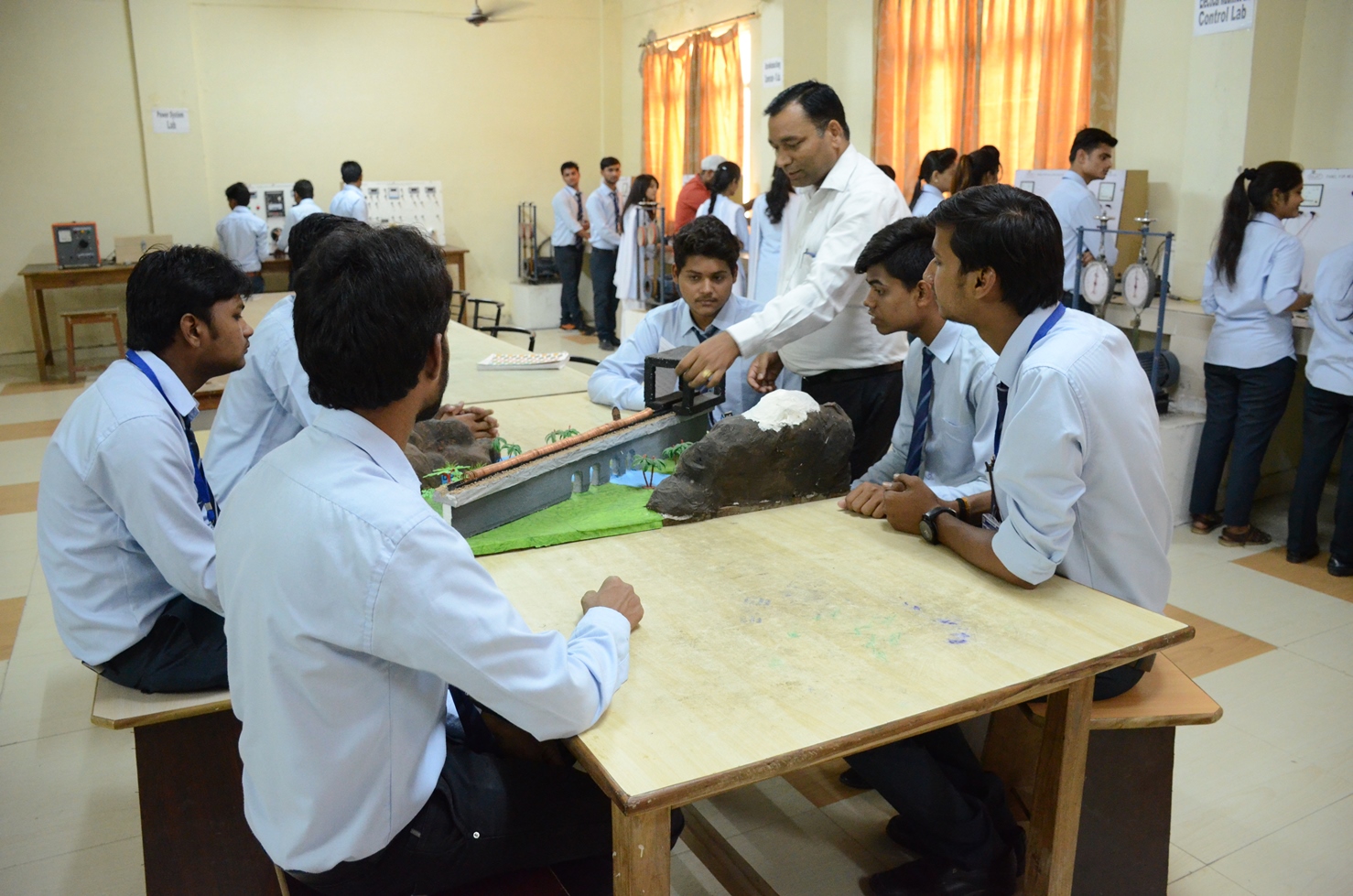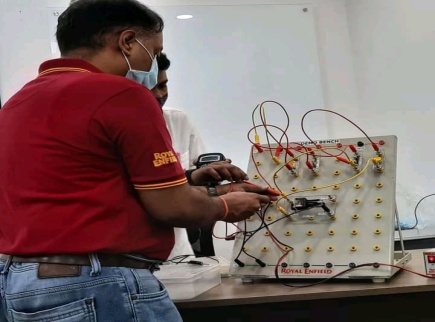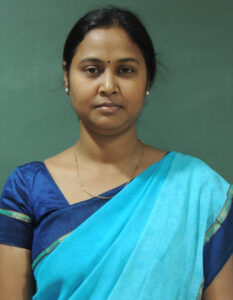About the Department
The department of Electrical engineering was established with an objective to develop talented and society responsible professionals through quality education to make a better India and, in turn, a better world. The department is currently offering B.Tech degree programme in Electrical engineering.
The department has good infrastructural facilities and is equipped with full fledged laboratories such as Basic Electrical Lab, Machines Lab I and II, Power Electronics Lab, Electrical measurement Lab, Electrical workshop etc. with latest simulation softwares e.g PSPICE, MATLAB etc..The department has audio visual facilities with over-head projectors for effective teaching with spacious classrooms, auditorium & Conference rooms. Our faculty members have academic expertise in their field of interest link Control & Instrumentation, Electrical Vehicles, Power systems etc. They are used to upgrade their skills by attending FDPs and STTPs time to time. The department has online access of journals for faculty members and students via Wiley Online Library.


With the aim to impart knowledge with innovative ideas, the students are given assignments and exercise problems to equip themselves for the examination in the teaching learning process. The faculty and staff identify slow learners and give them training to enable them to cope with the other peers in the respective class. The meritorious students are given special training on current research areas. An in-house “ Center of Excellence” established with “Royal Enfield” within campus for practical exposure in automation field. Our pass-out students qualified many on & off campus interviews and now working in prime companies like UPPCL, DMRC, SIEMENS etc. The students of our department actively participate in various nontechnical and technical activities in & outside the campus which help them to organize seminars, workshops etc. and develop their personality. Our institute has been recognized as official nodal center of virtual labs IIT Kanpur ( An Initiative of MHRD, Govt. of India) and tie up with spoken tutorials, IIT Bombay for online training among students. Our students get benefit by virtual labs as well as e-learning and online certified courses by IITs, NPTEL, SWAYAM etc.
HOD Message
Welcome to the Department of Electrical Engineering at Goel Institute of Technology and Management, Lucknow. Our department started in the year 2010. Over the years, we have grown our expertise and competence in the core of electrical engineering.
The industry-oriented undergraduate program in electrical engineering prepares the students as per the industrial expectations and government requirements. The primary aim of our curriculum is to impart technical skills to students, promote their problem solving skills and innovation of new technologies. The students are encouraged to start-up with the support of GITM innovation cell. Many webinars, workshops, Hands-on-sessions, industrial visits and guest lectures are conducted time to time for upgradation of technical knowledge of students in the demanding and growing fields of this era.
We provide a very informal atmosphere between faculty and students. Faculty members are not only engaged in cutting edge technology research but are also very passionate about teaching. Alumni support has always been a great driving force in the progress of our department, who placed in reputed private and public sectors.
Our department has an ambitious plan of further improving both quality and quantity of education that can make a difference as well as have an impact at global level.

Dr. Priyanka Jaiswal
( Ph.D, M.Tech, B.Tech)
Dr Priyanka Jaiswal received B. Tech Degree in Electronics & Telecommunication Engineering and M.Tech degree in Electronics Engineering from the University of Allahabad after completed her graduation in science. She has completed a D.Phil degree in Electronic Science from the University of Allahabad in the year 2017 with a number of peer-reviewed international journals. Her areas of interest are efficiency improvement of electronic devices and embedded systems. Currently, she is working as an Assistant Professor with 6.5 years of teaching experience. She is also a member of the International Association of Engineers.
Program Educational Objectives (PEO)
- PEO1: To impart hands on knowledge and develop design capability needed to face challenging problems in different thrust areas of electrical and electronics engineering.
- PEO2: To apply the knowledge of electrical and electronics engineering in their profession efficiently as individuals and as team members for well being of society, pursue higher education and research.
- PEO3. To make students ready for industry and cooperate sector by enhancing managerial and soft skills in the domain knowledge with ethical and moral values.
Program Outcomes (PO)
- Engineering knowledge: Apply the knowledge of mathematics, science, engineering fundamentals, and an engineering specialization to the solution of complex engineering problems.
- Problem analysis: Identify, formulate, review research literature, and analyze complex engineering problems reaching substantiated conclusions using first principles of mathematics, natural sciences, and engineering sciences.
- Design/development of solutions: Design solutions for complex engineering problems and design system components or processes that meet the specified needs with appropriate consideration for the public health and safety, and the cultural, societal, and environmental considerations.
- Conduct investigations of complex problems: Use research-based knowledge and research methods including design of experiments, analysis and interpretation of data, and synthesis of the information to provide valid conclusions..
- Modern tool usage: Create, select, and apply appropriate techniques, resources, and modern engineering and IT tools including prediction and modelling to complex engineering activities with an understanding of the limitations.
- The engineer and society: Apply reasoning informed by the contextual knowledge to assess societal, health, safety, legal and cultural issues and the consequent responsibilities relevant to the professional engineering practice.
- Environment and sustainability: Understand the impact of the professional engineering solutions in societal and environmental contexts, and demonstrate the knowledge of, and need for sustainable development.
- Ethics: Apply ethical principles and commit to professional ethics and responsibilities and norms of the engineering practice.
- Individual and team work: Function effectively as an individual, and as a member or leader in diverse teams, and in multidisciplinary settings.
- Communication: Communicate effectively on complex engineering activities with the engineering community and with society at large, such as, being able to comprehend and write effective reports and design documentation, make effective presentations, and give and receive clear instructions.
- Project management and finance: Demonstrate knowledge and understanding of the engineering and management principles and apply these to one’s own work, as a member and leader in a team, to manage projects and in multidisciplinary environments.
- Life-long learning: Recognize the need for, and have the preparation and ability to engage in independent and life-long learning in the broadest context of technological change.
Program Specific Outcomes (PSO)
- PSO 1: An ability to specify, design and analyze the concepts and applications of designing, operation, communication and control in the field of electrical and electronics engineering.
- PSO 2: An ability to understand the technological advancements in the usage of modern design tools to analyze, design and deliver solution for a variety of applications.
- PSO 3: An ability to apply principles of electrical and electronics engineering for making the future plans and road maps with special concerns to social and environmental impact.
Mission
To promote technical education, innovation and research by the process of enhancing theoretical and practical electronics and communication skills.
To develop high level of professional ethics and morals and build up modern technological base of electronic principles, techniques and systems to cater the multidisciplinary requirements of the industry
To provide real life problem solving approach in the designing and analyzing aspects of circuits and software through interactions with our prominent alumnus, experts and R & D organizations in Electronics, Communication and IT sectors.
Faculty Members
Name |
Designation |
Qualification |
Experience |
|
Dr. RISHI ASTHANA |
PRINCIPAL/DIRECTOR |
B.Tech M.Tech Ph.D |
27 Years |
dr.rishiasthana@goel.edu.in |
Mr. AMIT KUMAR VERMA |
ASSISTANT PROFESSOR |
B.Tech M.Tech |
7 Years |
amit.verma@goel.edu.in |
Mr. CHETAN CHOUDHARY |
ASSISTANT PROFESSOR |
B.Tech M.Tech |
8 Years |
chetan.choudhary@goel.edu.in |
Mr. DHEERAJ KUMAR |
ASSISTANT PROFESSOR |
B.Tech M.Tech |
12 Years |
dheeraj.kumar@goel.edu.in |
Mr. MOHD SHARIQ ANSARI |
ASSISTANT PROFESSOR |
B.Tech M.Tech Ph.D (PERSUING) |
10 Years |
mo.shariq.ansari@goel.edu.in |
Mr. MOHIT SRIVASTAVA |
ASSISTANT PROFESSOR |
B.Tech M.Tech |
3 Years |
mohit.srivastava@goel.edu.in |
Mr. PREM NARAYAN VERMA |
ASSISTANT PROFESSOR |
B.Tech M.Tech Ph.D (PERSUING) |
9 Years |
prem.verma@goel.edu.in |
Mr. RISHI KUMAR |
ASSISTANT PROFESSOR |
B.Tech M.Tech |
15 Years |
rishi.kumar@goel.edu.in |
Mr. RUPESH KUMAR TRIPATHI |
ASSISTANT PROFESSOR |
B.Tech M.Tech |
5 Years |
rupesh.tripathi@goel.edu.in |
Mr. SAURABH KESHERWANI |
ASSISTANT PROFESSOR |
B.Tech M.Tech |
6 Years |
saurabh.kesherwani@goel.edu.in |
Mr. VIPIN KUMAR |
ASSISTANT PROFESSOR |
B.Tech M.Tech |
0.8 Years |
vipin.kumar@goel.edu.in |
Ms. NAHID HINA KHAN |
ASSISTANT PROFESSOR |
B.Tech M.Tech |
7 Years |
nahid.khan@goel.edu.in |
Ms. NEHA SINGH |
ASSISTANT PROFESSOR |
B.Tech M.Tech |
1 Years |
neha.singh@goel.edu.in |
Ms. POONAM YADAV |
ASSISTANT PROFESSOR |
B.Tech M.Tech |
5.5 Years |
poonam.yadav@goel.edu.in |
Ms. SWATIKA SRIVASTAVA |
ASSISTANT PROFESSOR |
B.Tech M.Tech |
9 Years |
swatika.srivastava@goel.edu.in |
